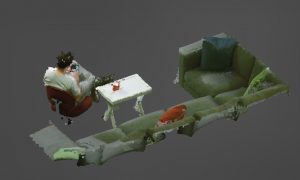Interactively exploring 3D scanned dynamic environments

Status
This project started in Fall 2020 and has been successfully completed in 2023.
Researchers
Prof. Christian Holz (ETH CS)
Dr. Andreas Fender (ETH CS)
Sensing, Interaction & Perception Lab, ETH Zürich
Industry partner
Die Post
Description
Swiss Post is active in areas that touch many parts of our daily lives, be it communication through mail, transportation, banking, and not least as a large employer in Switzerland. The goal of this project is to showcase the diversity of Swiss Post as a workplace through immersive, realistic and representative 3D experiences that people may discover and explore using emerging technologies, including Virtual Reality headsets and interactive 3D experiences on tablets and mobile devices. These experiences will give people unfamiliar with many of the activities of Swiss Post novel opportunities for insight into the daily lives of Swiss Post employees and customers across a variety of divisions. The immersive 3D experiences we are creating in this project are based on actual 3D scans of Swiss Post environments, fully interactive and ready to be explored to understand the World of Swiss Post. A second goal of this project is to use the rich captures of daily procedures performed by Swiss Post employees for training purposes of new personnel, thereby moving away from text-based instructions to immersive 3D scenarios that will aid learning on the job.
Approach
Solving the problems mentioned above and creating immersive 3D experiences based on scanned dynamic environments at Swiss Post requires processing technologies that fuse depth maps and textures from multiple high-resolution RGB and depth cameras into a coherent model. Post-processing needs to fuse the resulting point clouds into high-quality 3D meshes, removing artifacts and temporal inconsistencies, so as to render meshes in 3D for interactive consumption. To this end, we will build on our frameworks for fusing multi-camera input in conjunction with emerging point-cloud processing techniques and deep learning-based methods for scene understanding. Building on this will be a layer of interactivity, where elements of the 3D scene come to life and respond to user input. Using our experience in creating immersive 3D experiences, we will build and evaluate suitable interaction techniques for end users to interact with these 3D experiences, either in Virtual Reality or through touch controls on mobile devices.
Publications:
DeltaPen: A Device with Integrated High-Precision Translation and Rotation Sensing on Passive Surfaces.
Guy Luethy, Andreas Fender, and Christian Holz.
Proceedings of ACM UIST 2022.
[PDF]
Causality-preserving Asynchronous Reality.
Andreas Fender and Christian Holz.
Proceedings of ACM CHI 2022.
[PDF]
